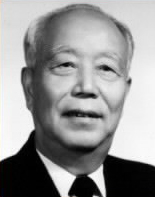- Wan Li
Infobox Officeholder
name = Wan Li
万里
萬里

imagesize = 200px
small
caption =
order =
office = 5th Chairman of the NPCSC
term_start = April 13, 1988
term_end = March 27, 1993
predecessor =Peng Zhen
successor =Qiao Shi
order1 = 4th Executive Vice Premier of thePeople's Republic of China
term_start1 = 1983
term_end1 = 1988
predecessor1 =Deng Xiaoping
successor1 =Yao Yilin
premier1 =Zhao Ziyang Li Peng
birth_date = December, 1916
birth_place =
death_date =
death_place =
nationality = Chinese
party =Communist Party of China
spouse =
children =
footnotes =Wan Li (
Traditional Chinese : 萬里;Simplified Chinese : 万里) (born December, 1916) was during a long administrative career in thePeople's Republic of China Vice Premier,National People's Congress Chairman, and a member of theChinese Communist Party (CCP)Central Committee , its Secretariat and itsPolitburo .Pre-1949
Wan Li joined the
Communist Party of China in 1936, [Editorial Board, "Who's Who in China: Current Leaders" (Foreign Language Press, Beijing: 1989), p. 662; hereafter Who's Who.] and served in party administrative positions, many inShandong province, from county level on up. In 1937-38, Wan was CCP Secretary (i.e., head) of Dongping County, in 1938-40 Propaganda and Organization Department director in Taixi Prefecture, deputy head of propaganda for Western Shandong regional CCP committee in 1940, and Secretary of the party's 2nd, 7th and 8th Prefecttural Committees in the Hebei-Shandong-Henan Border Area in 1940-47. [ibid.] In the last phases of the Civil War, he was Secretary-General of the Border Area committee (1947-49).Early Liberation Years
After the establishment of the
People's Republic of China in 1949, Wan was named deputy director of the finance department of the Nanjing Municipality Military Control Committee, director of the Economic Department and Chief of the city Construction Bureau. ["Who's Who"] , all within a few months. He served as Deputy Director of the CCP South-west Military and Administrative Committee's Industrial Department (1949-52), where he would have encounteredDeng Xiaoping .Wan moved into national-level politics shortly thereafter, as Vice Minister of Architectural Engineering (1953) and Minister of Urban Construction (1955). From 1958, he was a secretary of the
Beijing Municipality CCP Committee (underPeng Zhen ) and Vice Mayor of the city government. [ibid.]Post GPCR
After being purged in the
Great Proletarian Cultural Revolution , Wan was restored to his Beijing posts in 1973. He was named Minister of Railways in January 1975 (to April 1976) and 1st Vice Minister of Light Industry in 1977. In May of the same year, he took overAnhui Province as CCP 1st Secretary and Chairman of the Revolutionary Committee (i.e., government). [ibid.]In Anhui, Wan Li was responsible for the earliest post-Mao agraian reform. On his own authority, he instituted a contract responsibility system whereby farmers divided communal lands and assigned them to individual farmers. His six guidelines (the "Anhui liu tiao") relaxed controls on trading as well, permitting farmers to sell surplus produce independently. Peasants were allowed to grow vegetables on 3/10th of a "mu" and did not have to pay taxes on wheat and oil-bearing plants grown on private plots. [Becker, Jasper, "Hungry Ghosts: China's Secret Famine," John Murray (London: 1996), p. 261.]
After their initiative was supported by Wan Li, and later in
Sichuan province byZhao Ziyang , it became national policy. The Anhui agricultural reforms were heralded as brilliant innovations by the central government. Wan Li was immortalised in the folk saying "If you want to eat rice, look for Wan Li." (要吃米, 找万里)Wan was elected to the 11th Central Committee in 1977, and to the CC Secretariat in February 1980. In April he was made Vice Premier, in August Minister of the State Agricultural Commission and in September, a member of the Standing Committee of the
Chinese People's Political Consultative Congress . [Lamb, Malcolm, "Directory of Officials and Organizations in China, 1968-1983" (M.E. Sharpe, New York: 1984).]Wan Li became the Vice Premier in 1984 and the Chairman of the
National People's Congress in 1988. Because he was sympathetic to the student movement during theTiananmen Square protests of 1989 , he was temporarily put under house arrest but was soon able to resume his work.Wan Li retired in 1993. In 2004, he called for more democratic decision-making procedures in China to improve the country's "imperfect" Socialist system and boost economic development.
Along with 20 other retired Politburo members, they openly asked the Central Government to rehabilitate former General Secretary and Premier
Zhao Ziyang ’s name and hold memorial services for him for his many important contributions to China.References
Wikimedia Foundation. 2010.
